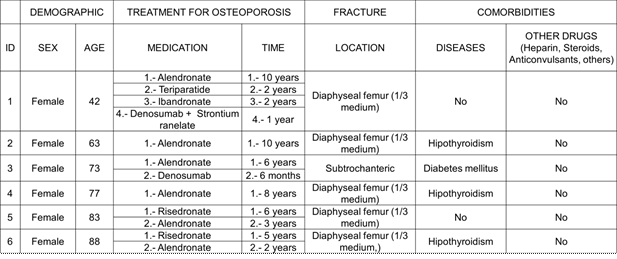Session Information
Date: Sunday, November 8, 2015
Title: Osteoporosis and Metabolic Bone Disease - Clinical Aspects and Pathogenesis Poster
Session Type: ACR Poster Session A
Session Time: 9:00AM-11:00AM
Background/Purpose:
Actually, Biphosphonates are considered the first line treatment for
osteoporosis. One of the side effects of the continuous treatment with these
drugs is the development of atypical fractures. These are generally
subtrochanteric, although they can appear anywhere in the femoral diaphysis,
with a low prevalence (1.1% of all the femur fractures). Their incidence grows
with the time to exposure to bisphosphonates.
To determine the prevalence of atypical fractures according to the
American Society of Mineral and Bone Research (ASMBR) criteria between 2011 and
2014 in the Universitary Hosptial of Donostia (Guipúzcoa, Spain) and describe
the demographic and sanitary features in these patients.
Methods:
Retrospective research of clinical data of patients operated of hip
fracture and/or femur fractures between November 2011 and December 2014
Variables included were: age, sex, race, clinical features, treatment received,
and presence or absence of diseases and pharmacological treatments that
participate in the bone remodeling.
Results:
921 patients operated of hip
fracture and 76 of diaphyseal fracture. 6 patients met the clinical and
radiologic criteria of the ASMBR for an atypical fracture, 100% of these had
received a long term treatment with biphosphonates and ment the 6,57% of the
diaphyseal fractures, the 0,12% of the hip fractures and the 0,6% of the total
of the fractures studied. The most used biphosphonate was Alendronate, being in
the 66,6% of the patients the first treatment used for osteoporosis. The median
time of exposure to biphosphonates was 8,5 years (IQR=3).
In the 83,3% of the patients the
fracture was situated in the medial third of the femoral diaphisis.
Conclusion:
–
In our study the prevalence of atypical
fractures with biphosphonates was low, a 0,6% of all of the fractures studied.
–
No alternative cause was found, nor clinical nor
pharmacological, to the take of biphosphonates that explained the atypical
fractures.
To cite this abstract in AMA style:
Uriarte Ecenarro M, Errazquin Aguirre N, Egües Dubuc CA, Meneses Villalba CF, Aldasoro Caceres V, Belzunegui Otano J, De la Herran G. Prevalence of Atypical Fractures in a Tertiary Hospital [abstract]. Arthritis Rheumatol. 2015; 67 (suppl 10). https://acrabstracts.org/abstract/prevalence-of-atypical-fractures-in-a-tertiary-hospital/. Accessed .« Back to 2015 ACR/ARHP Annual Meeting
ACR Meeting Abstracts - https://acrabstracts.org/abstract/prevalence-of-atypical-fractures-in-a-tertiary-hospital/

